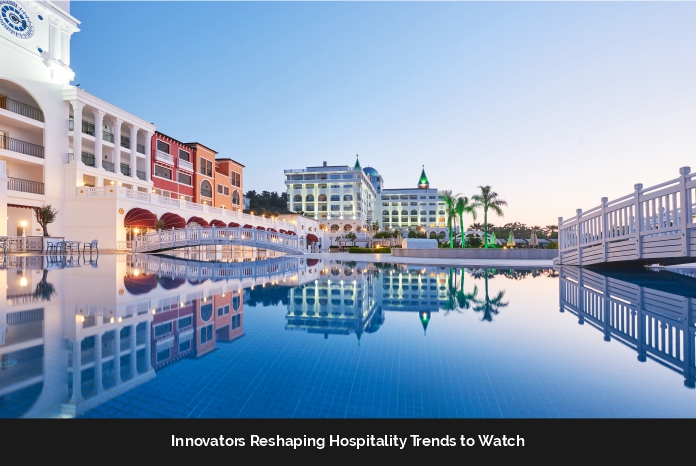The hospitality industry is undergoing a significant transformation, driven by innovative leaders who are redefining traditional practices and setting new benchmarks for excellence. This transformative phase is characterized by a convergence of technology, sustainability, and personalization, all of which are shaping the future of hospitality.
Technology Integration
The integration of advanced technology is one of the most prominent trends revolutionizing the hospitality industry. Modern innovations are not only streamlining operations but also enhancing the overall guest experience.
- Smart Room Technology: Smart rooms equipped with voice-controlled systems, smart lighting, and temperature management are becoming increasingly common. According to a report by Hotels.com, 56% of travelers now consider smart room features a significant factor in their choice of accommodation. These technologies provide guests with more control over their environment, allowing them to customize their experience to their preferences.
- AI-Driven Customer Service: Artificial Intelligence (AI) is playing a crucial role in transforming customer service within the hospitality sector. AI-powered chatbots and virtual assistants are being employed to handle routine inquiries, make reservations, and provide instant responses to guest requests. A study by Forbes highlights that 70% of hotel chains are investing in AI technologies to improve operational efficiency and guest engagement.
- Mobile Apps and Contactless Solutions: The adoption of mobile apps and contactless solutions has surged, particularly in the wake of the COVID-19 pandemic. Mobile check-in, digital room keys, and contactless payments have become standard features. According to Statista, 65% of hotel guests prefer using mobile apps for check-in and room control, reflecting a shift towards more convenient and hygienic solutions.
Sustainability and Ethical Practices
Sustainability is increasingly becoming a central focus for leaders in the hospitality industry. The push towards eco-friendly practices is driven by both consumer demand and a commitment to environmental stewardship.
- Energy Efficiency: Hotels are adopting energy-efficient technologies, such as LED lighting, energy management systems, and solar panels. According to the Global Sustainable Tourism Council, hotels that implement energy-saving measures can reduce their energy consumption by up to 30%, which not only lowers operational costs but also minimizes their carbon footprint.
- Waste Reduction: Many hospitality leaders are also focusing on waste reduction through initiatives like zero-waste programs and recycling. Hilton Hotels has committed to reducing its waste output by 50% by 2030, demonstrating a proactive approach to waste management and environmental impact.
- Sustainable Sourcing: Sourcing sustainable products is another key aspect of modern hospitality. Many hotels are now prioritizing locally sourced and organic food, eco-friendly amenities, and sustainable materials in their operations. The Sustainable Hospitality Alliance reports that 80% of major hotel chains have integrated sustainability criteria into their procurement processes.
- Promotion of Local Culture: Embracing and promoting local culture is becoming an integral part of sustainability efforts. Many hotels are incorporating local art, cuisine, and traditions into their guest experiences. This not only supports local artisans and businesses but also provides guests with a more authentic experience.
Personalized Guest Experiences
Personalization is emerging as a critical factor in enhancing guest satisfaction and loyalty. Modern leaders in hospitality are leveraging technology and data to tailor services to individual preferences.
- Customized Room Settings: Hotels are offering guests the ability to customize their room settings, from lighting and temperature to preferred pillow types and room fragrances. This level of personalization enhances comfort and satisfaction, leading to higher guest retention rates.
- Data-Driven Insights: The use of data analytics is enabling hotels to gain a deeper understanding of guest preferences and behaviors. By analyzing booking patterns, review feedback, and social media interactions, hotels can offer personalized recommendations and tailor their services to meet the unique needs of each guest. A report by McKinsey reveals that personalized experiences can increase customer satisfaction by 20% and drive repeat business.
- Tailored Travel Recommendations: Personalized travel recommendations are becoming a standard offering. Many hotels and travel companies are using AI to suggest activities, dining options, and local attractions based on guest preferences and previous behavior. This trend enhances the overall travel experience by providing guests with curated recommendations that align with their interests.
Conclusion
As the hospitality industry continues to evolve, the integration of technology, commitment to sustainability, and focus on personalization are shaping its future. Innovators in the sector are leading the way by adopting advanced technologies, implementing eco-friendly practices, and delivering highly personalized guest experiences. These trends not only improve operational efficiency and guest satisfaction but also set new standards for excellence in the industry. By embracing these changes, hospitality leaders are paving the way for a more dynamic and responsible future in travel and accommodation.





